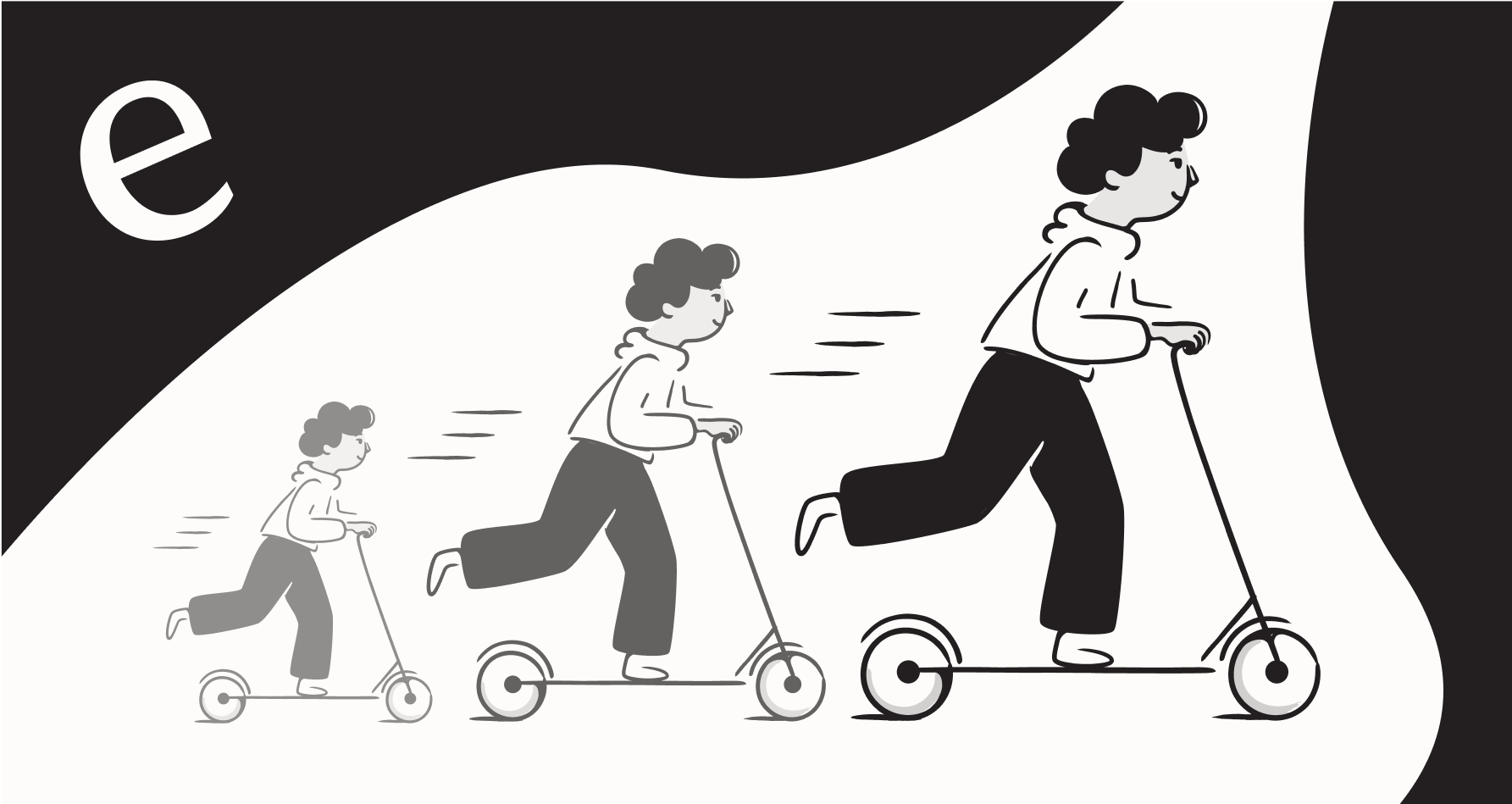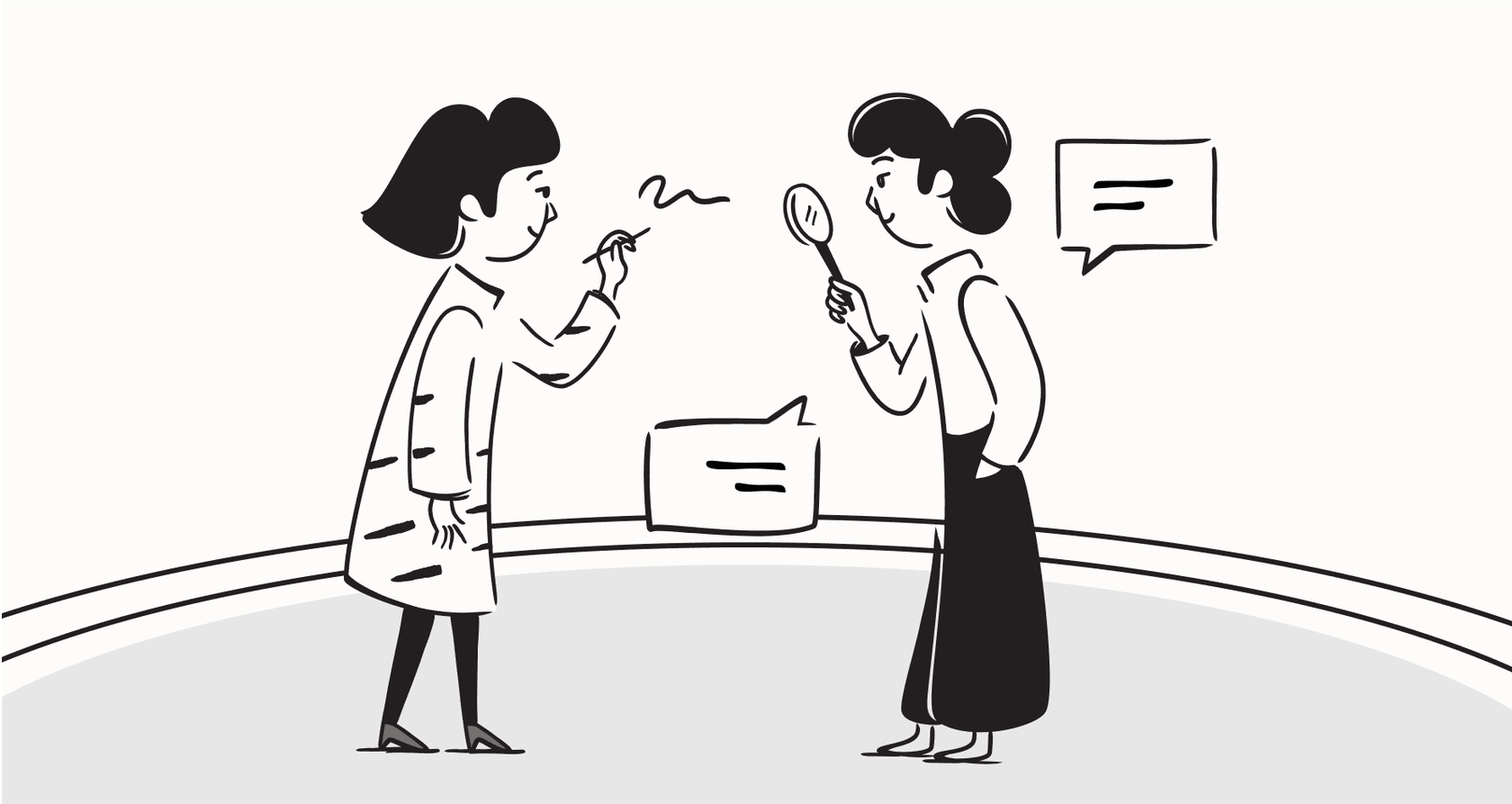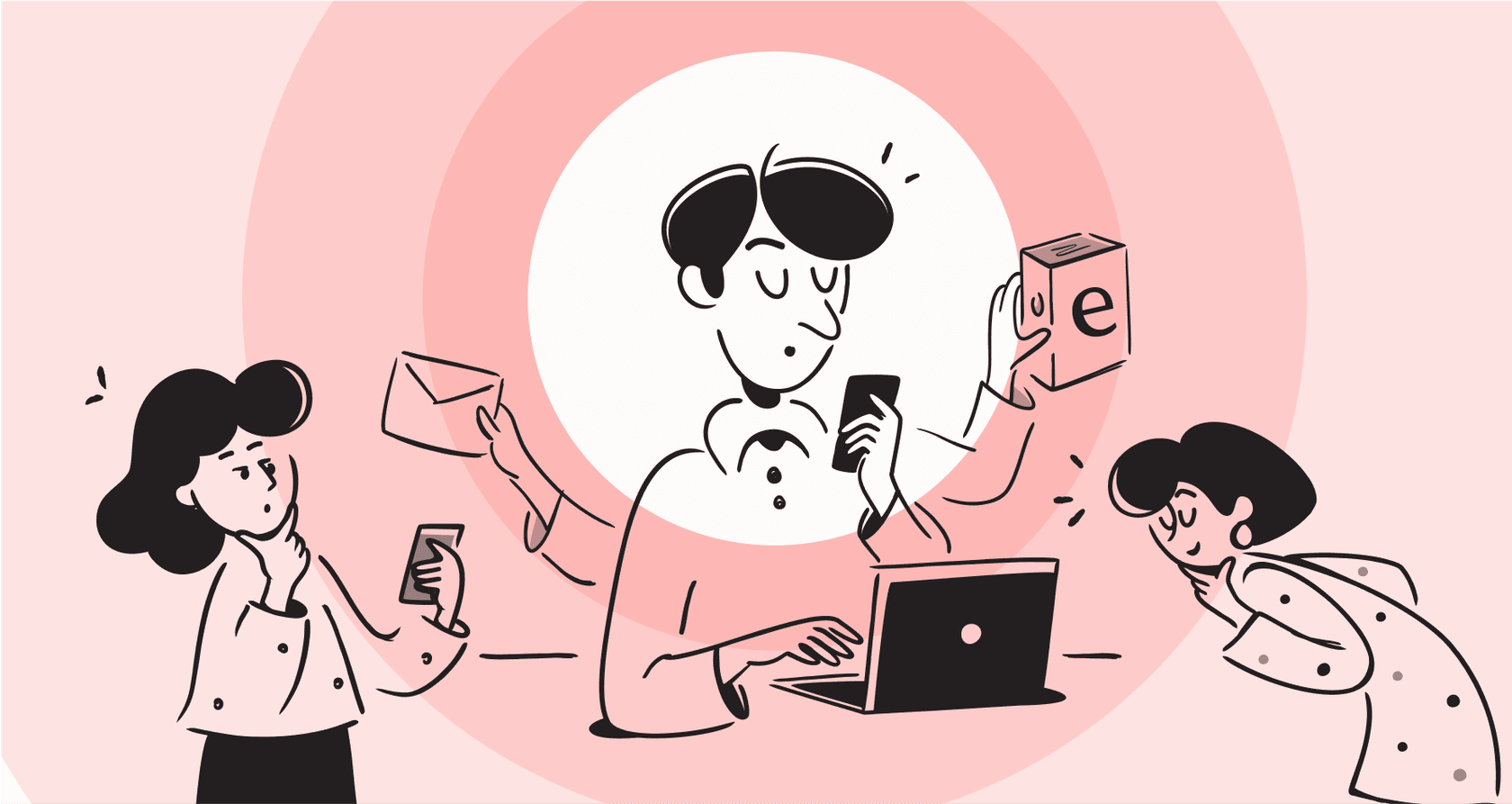
Everyone’s talking about AI chatbots. But if we're being honest, some of them can be a bit clunky or complicated for what they do. You're promised easy automation, but you want to make sure you choose a tool that supports your customers and your team effectively.
Picking the right chatbot can be the difference between a seamless customer journey and a setup process that requires careful planning.
I've spent a ton of time testing these platforms to figure out which ones actually work as advertised. This guide gets straight to the point, reviewing the top 6 options to help you find a chatbot that will genuinely help your team and keep customers happy.
Defining the best chatbots for customer service
In simple terms, AI chatbots for customer service are tools that use artificial intelligence to understand and answer customer questions like a real person would. They’re basically your first line of support, ready to help out 24/7.
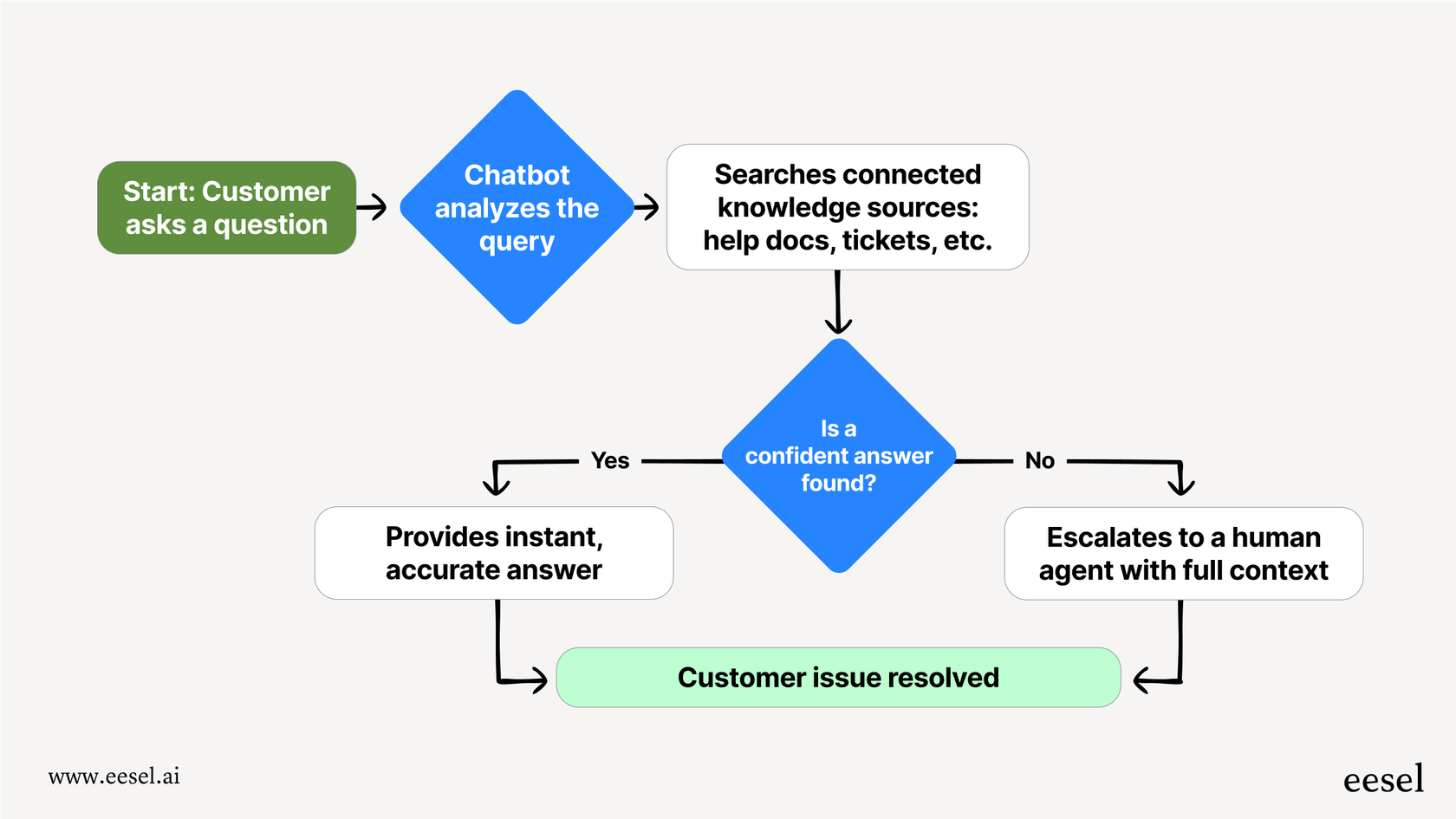
They work by digging into all the information you already have, your help docs, FAQs, and even old support tickets. This lets them give out accurate answers on their own, handle simple tasks like checking on an order, and juggle tons of conversations at once. Unlike the old-school bots that just followed a script, today's best chatbots can handle more complex questions and know when it's time to loop in a human agent.
Key benefits for support teams
So, why even bother with a chatbot? When you get a good one, the perks are pretty obvious and go beyond just answering questions.
For starters, you get to offer support around the clock. Your customers can get instant help anytime, anywhere, without you needing to staff a full team overnight. It also frees up your agents from answering the same questions over and over. This lets them focus their energy on the tougher issues where their expertise is actually needed.
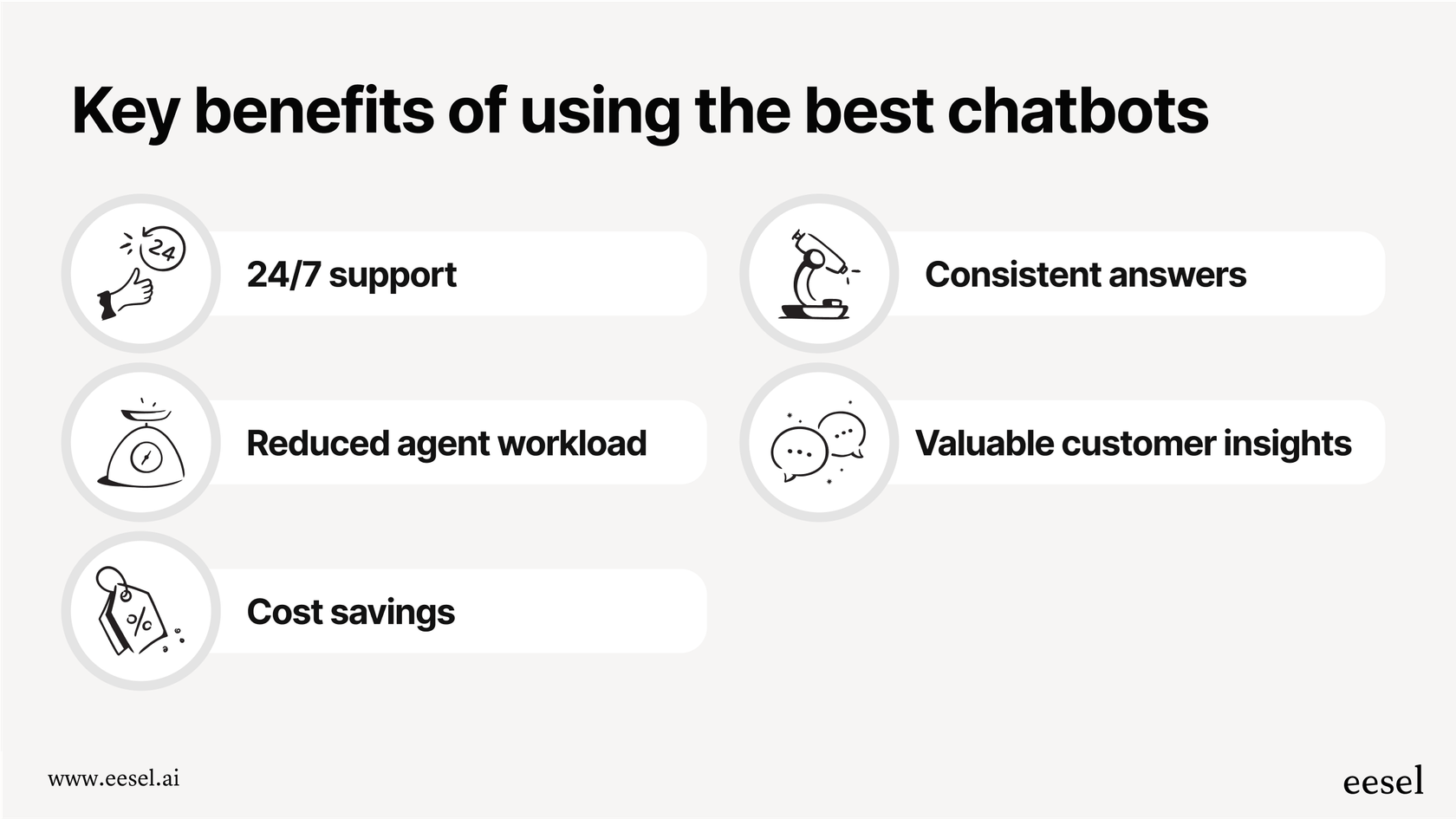
You also get to handle more customer conversations efficiently, which is great for your budget. A good bot provides the same on-brand answer to common questions every single time, making your support feel consistent and reliable. Plus, they’re great for spotting trends. You can see what your customers are asking about most, which might point out a gap in your knowledge base or an opportunity to make your product better.
How we chose the best chatbots for this list
When I put this list together, I looked beyond the fancy feature lists. I wanted to know what really matters to a busy support team. A great chatbot should make your job easier, not give you one more thing to manage.
First, how easy is it to set up and use? I wanted to know if you could get it running quickly on your own or if it was designed for a more comprehensive implementation.
Next, how well does it connect with your other tools? A chatbot should plug right into your helpdesk, whether that’s Zendesk or Freshdesk, and learn from your documents in places like Confluence or Google Docs.
I also looked at control. Can you tweak the bot's tone to match your brand? Can you set clear rules for when it should hand off a conversation to a person?
And of course, pricing. Is it straightforward and transparent? Ultimately, I was looking for tools that solve real problems and make a support team's life a little less chaotic.
The best chatbots of 2026: A quick comparison
Here’s a quick rundown of how our top picks compare.
| Tool | Best For | Key Integration | Pricing Model |
|---|---|---|---|
| eesel AI | Teams that want fast, self-serve setup without replacing their helpdesk | Zendesk, Freshdesk, Slack, Confluence | Flat monthly fee |
| Ada | Enterprise-scale automation with deep customization | Zendesk, Salesforce, ServiceNow | Custom (Quote-based) |
| Zowie | Ecommerce brands focused on ticket deflection | Shopify, Magento, Gorgias | Custom (Quote-based) |
| Freshchat (Freddy AI) | Businesses already using the Freshworks ecosystem | Freshdesk, Freshsales, Shopify | Per-agent pricing |
| Tidio | Small businesses needing a simple, budget-friendly solution | Shopify, WordPress, Wix | Free plan, with paid plans per seat |
| Zendesk AI | Teams looking for a powerful, native solution within the Zendesk platform | Deep integration with Zendesk Suite | Add-on to Zendesk plans |
A detailed look at the 6 best chatbots
Let's get into the details of what makes each of these tools tick, including the strengths and considerations for each.
1. eesel AI
eesel AI is for teams that want a smart chatbot without the pain of a long implementation. It’s built to work with the tools you already have, so you don't have to change your entire workflow.
What I really like about it is how fast you can get going. You can launch it in minutes. While some enterprise platforms involve more detailed setup, eesel AI is completely self-serve. You can connect your helpdesk and knowledge docs and have a bot ready to go all on your own. It pulls information from everywhere, help articles, past tickets, Google Docs, Confluence, and even internal Slack threads, to make its answers much more accurate.
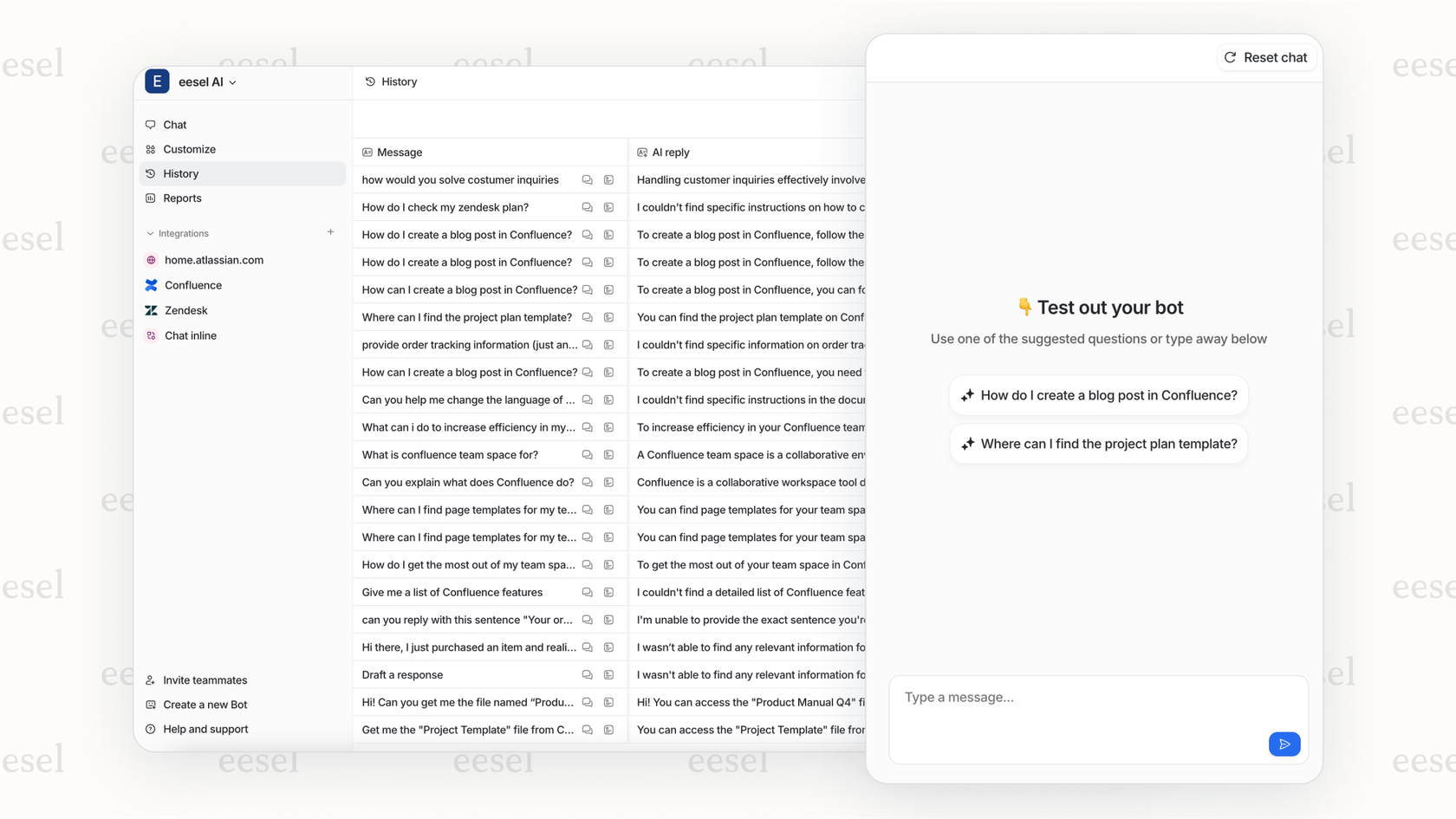
The best part? You can test it out with confidence. eesel AI has a simulation mode that lets you see how it would have handled thousands of your past tickets before it ever talks to a real customer. This gives you a solid idea of its resolution rate and lets you tweak its settings in a safe space. You get full control over what it automates and when it passes a ticket to your team.
- Pricing: Starts at $299/month. The pricing is transparent and based on how much you use it, not how many tickets it solves. No surprise fees.
- Pros: Incredibly simple setup, learns from all your company knowledge, has a risk-free simulation mode, and no per-resolution fees.
- Cons: It's a newer tool compared to some of the long-standing platforms on this list.
2. Ada
Ada is a heavy-duty platform designed for large companies that need to automate customer service on a huge scale. If you’re a big business with customers all over the world, Ada is probably on your list.
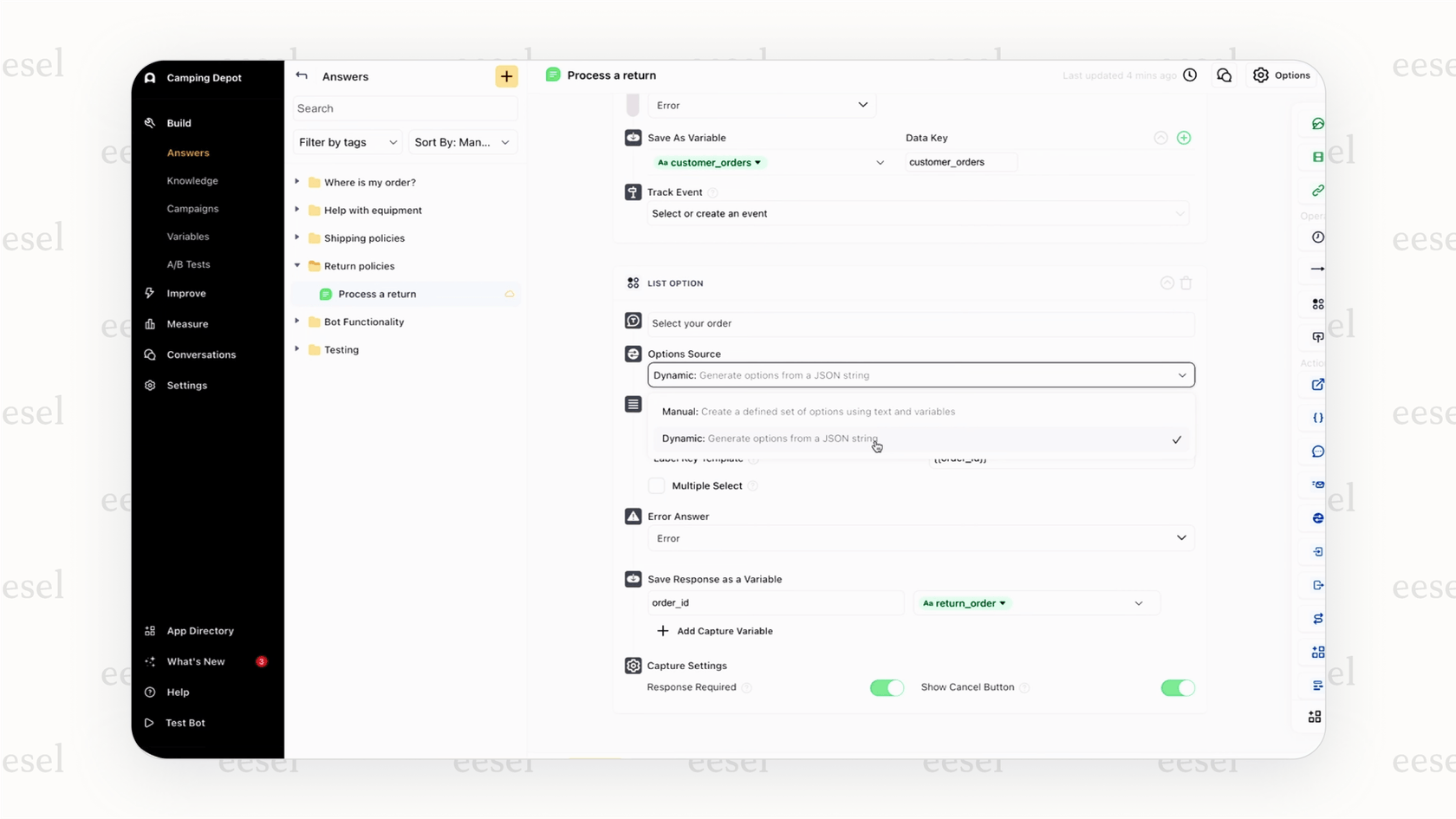
It gives you a ton of customization options, has powerful AI that can handle complex conversations in many languages, and includes a no-code builder that anyone can use. It’s a real workhorse. However, all that power involves a significant investment and a more thorough setup process. It’s a specialized tool for teams ready for a deep enterprise implementation. For those needing something more immediate, a self-serve option like eesel AI might be a faster alternative.
- Pricing: Custom pricing. You’ll have to go through a demo and get a formal quote.
- Pros: Scales well for large companies, has powerful AI for tricky questions, and strong security features.
- Cons: Higher investment required, has a longer implementation timeline, and may be more than small teams need.
3. Zowie
Zowie is a chatbot with a very specific mission: to help e-commerce businesses manage repetitive support tickets.
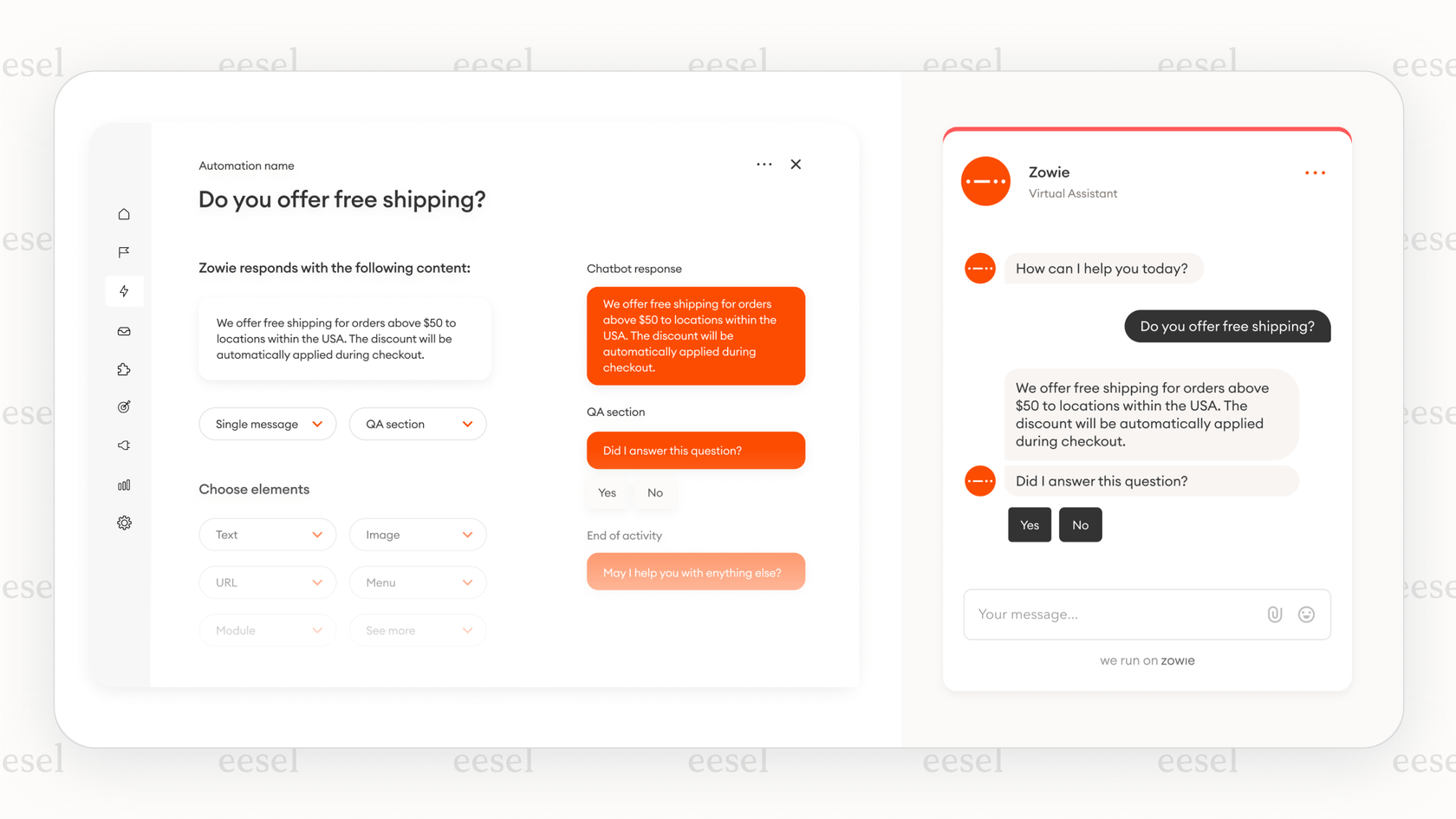
And it's really good at it. It connects directly with platforms like Shopify and Magento, so it’s great at answering common questions like "Where is my order?" or "How do I start a return?". For online stores, it’s a fast and effective way to manage the support queue. The main consideration is its specialization. If you're not in e-commerce, or if your team needs a bot that can learn from internal docs in Confluence or Google Docs, Zowie might be limited. A more flexible tool like eesel AI could be a better choice in those cases.
- Pricing: Custom pricing, you'll need to schedule a demo.
- Pros: Perfect for handling common e-commerce questions and is quick to set up for retail brands.
- Cons: Highly specialized for specific industries and has fewer connections to general knowledge sources.
4. Freshchat (Freddy AI)
Freshchat is the chatbot tool from Freshworks, powered by their Freddy AI. It’s a decent mix of live chat and automation that can help most support teams.
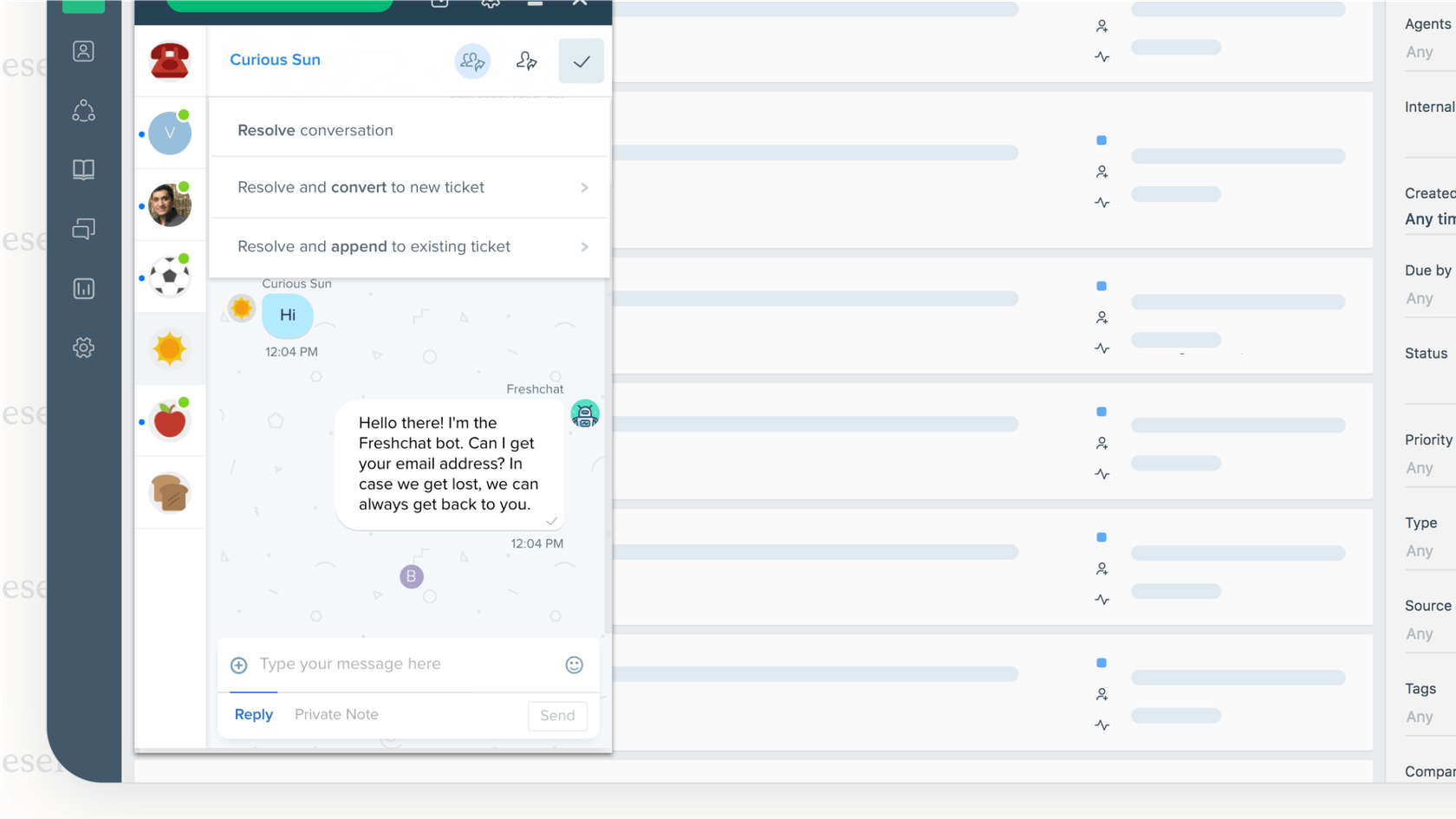
Its biggest advantage is for companies that are already using other Freshworks tools like Freshdesk or Freshsales. For those teams, the integration is seamless and just works. One consideration is that it is primarily designed for the Freshworks ecosystem. If your company's knowledge is stored somewhere else, like in Notion or internal wikis, it may require more effort to set up compared to a platform like eesel AI that is built for diverse integrations.
- Pricing: Paid plans start at $19/agent/month.
- Pros: Integrates perfectly with other Freshworks products and has good basic features.
- Cons: Works most effectively inside its own ecosystem and can be limiting for teams using a wider variety of external tools.
5. Tidio
Tidio is a popular choice for small businesses and solo entrepreneurs who need a simple, cost-effective way to add live chat and a basic chatbot to their site.
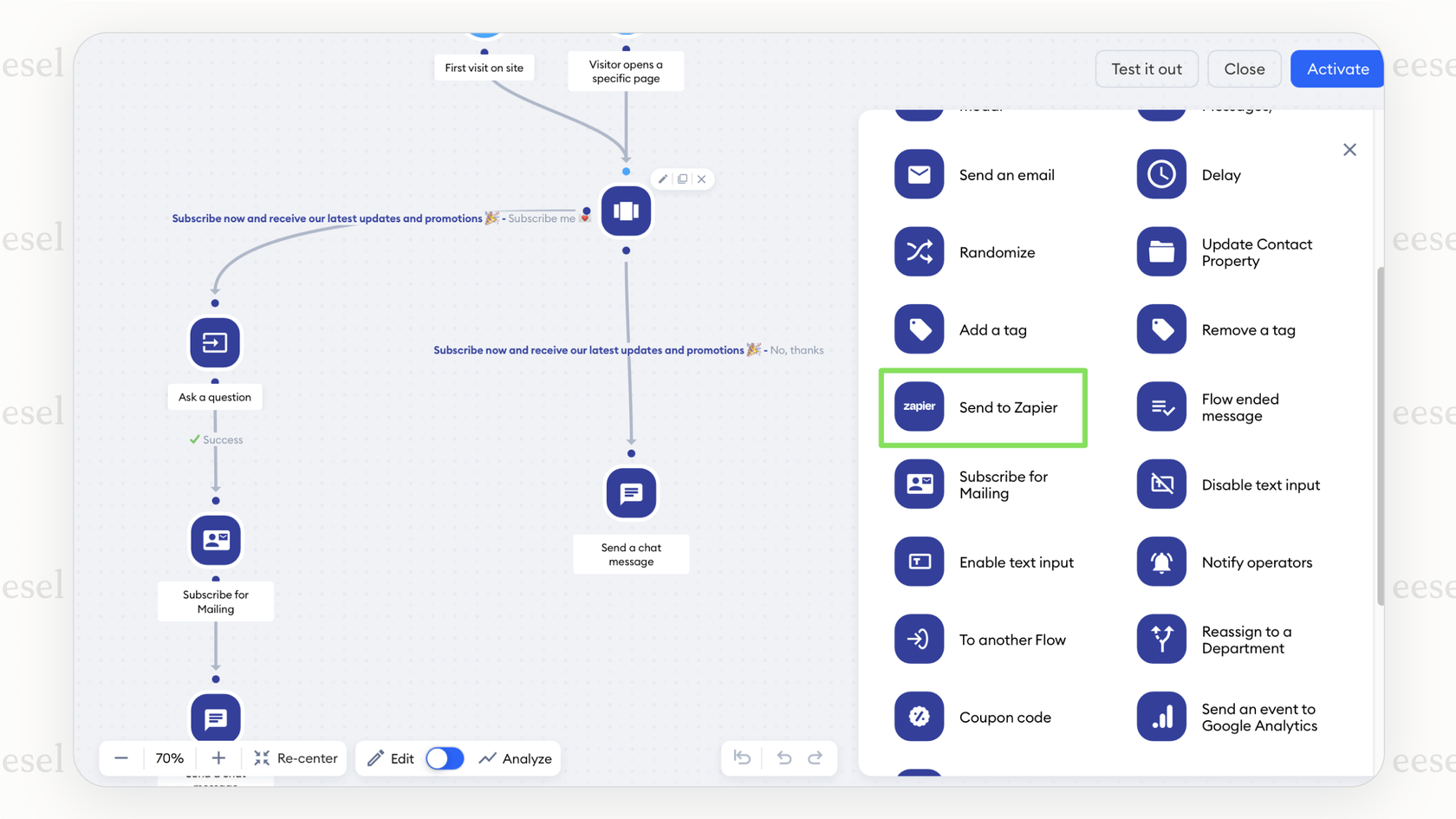
It's on this list because it has a pretty good free plan, is super easy to install on sites like WordPress and Shopify, and has a visual builder that makes sense even if you're not technical. It’s a great place to start. That said, Tidio is designed for simpler needs. As teams grow and handle more complex issues or higher volumes, they might find they need the more advanced AI capabilities and simulation features found in a tool like eesel AI.
- Pricing: Has a free plan; paid plans start around $25/month.
- Pros: Very affordable, incredibly easy to set up, and user-friendly.
- Cons: Basic AI features and may not scale as well for growing support teams with complex needs.
6. Zendesk AI
If your team lives in Zendesk, their own AI tool is a natural and powerful choice. It’s built to work perfectly with Zendesk tickets, macros, and help articles, making it a reliable extension for any Zendesk admin.
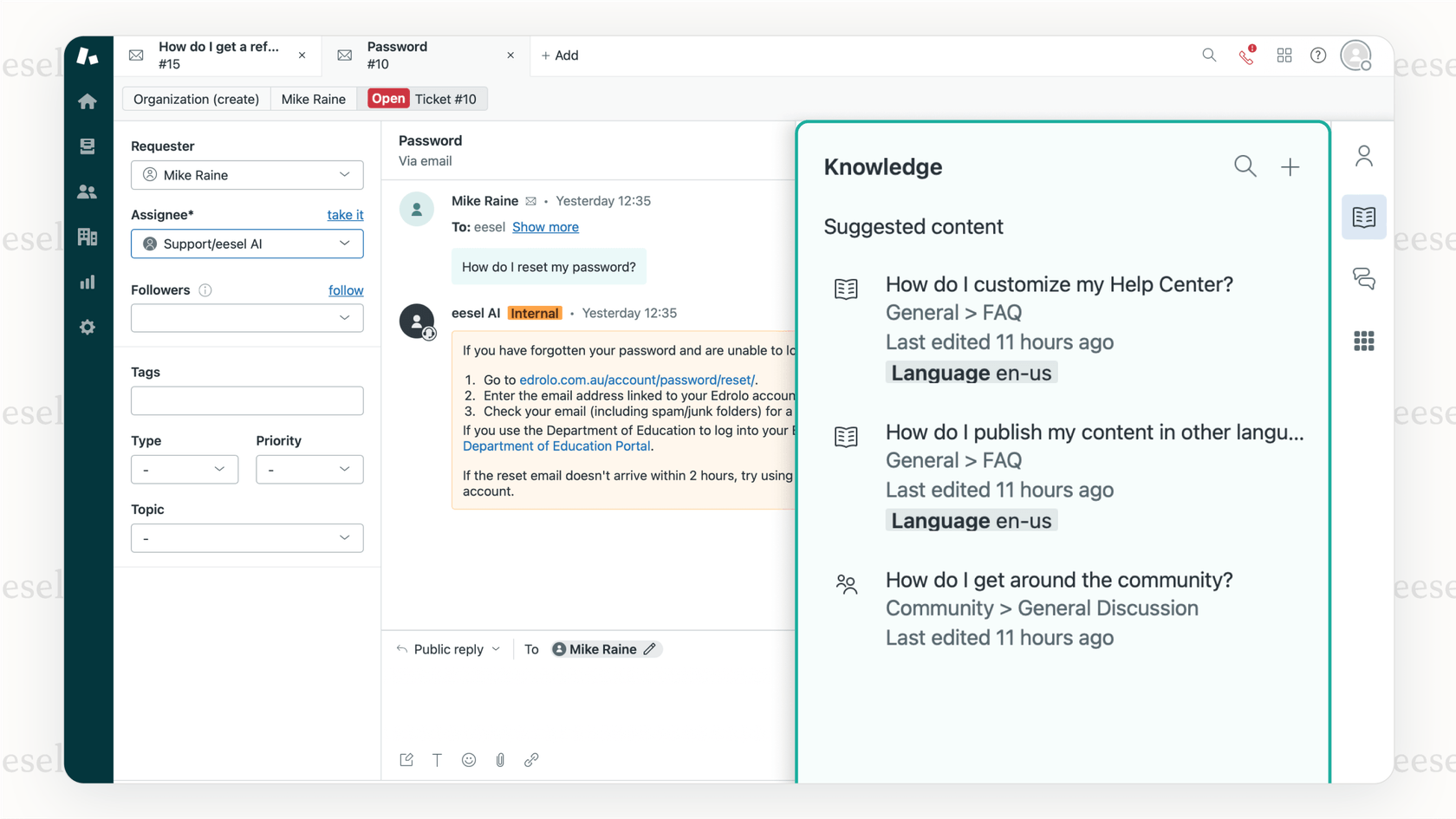
This deep integration is a major strength. Zendesk AI provides an enterprise-grade solution that ensures consistent and secure automated responses within the Zendesk platform. It’s a mature, trusted system that scales effortlessly with your business. While it primarily focuses on the data within Zendesk, many teams find that pairing it with a complementary tool like eesel AI allows them to easily tap into external knowledge sources like SharePoint or Google Docs. This makes Zendesk the perfect foundation for a robust AI strategy.
- Pricing: It’s a comprehensive add-on for Zendesk Suite plans.
- Pros: Seamless integration with Zendesk, enterprise-grade reliability, and easy for existing admins to use.
- Cons: Optimized for Zendesk data, though it is easily enhanced with complementary ecosystem tools.
I tested 6 top AI chatbots in 2026 to reveal which one is best for productivity, content, coding, customer service, and more.
How to choose the best chatbots for your business
So, with all these options, how do you pick the right one? Here are a few questions to ask yourself.
First, what's your main goal? Are you just trying to manage simple, repetitive questions? Or do you need something that can walk customers through more detailed problems? Knowing what you want to accomplish will help you focus on the features that actually matter.
Next, take a look at your current tools. The best chatbot is one that works with the software you already use. Platforms like Zendesk offer incredible native power, and you can always look for flexible additions to enhance them further.
Then, think about your time and resources. Do you have the capacity for an enterprise implementation, or do you need something you can launch yourself this afternoon? A tool like eesel AI lets you get started in minutes, which is a great option for fast-moving teams.
Finally, ask for a way to try it out. Many platforms offer demos or trials. See if you can use a simulation mode that shows you exactly how the bot will perform with your real customer data before you commit.
From automation to collaboration
The goal of a good chatbot isn't to replace your support team; it's to make their jobs easier. The best setup is one where the bot handles all the routine tasks, which gives your team the time and focus to handle the conversations that really need a human touch. It’s all about finding that sweet spot between AI efficiency and human expertise.
The right tool should feel like a helpful teammate, contributing to a more effective and supportive environment every day.
Ready to see how a flexible, self-serve AI can help your support team? With eesel AI, you can connect your knowledge sources and see how it would perform on your real tickets in just a few minutes. Start your free trial or book a demo today.
Frequently asked questions
It varies widely. Enterprise tools can take some time to set up for complex needs, but many modern platforms like eesel AI are designed for a self-serve launch in just a few minutes. You simply connect your helpdesk and knowledge sources without needing a developer.
A common consideration in the industry is AI pricing structures. For example, Zendesk's AI pricing model offers tiered options to align costs with team needs. It’s always helpful to look for platforms with transparent pricing that fits your specific budget.
The top platforms give you full control over when to escalate to a human agent. You can set up specific rules based on keywords, customer sentiment, or topic complexity to ensure difficult issues are always handled by your team.
Yes, you don't need a massive budget. Some tools like Tidio offer free plans for very basic needs, while others like eesel AI provide powerful AI and quick setup at a price point that works for small to medium-sized businesses.
Modern AI chatbots learn directly from your own company's content, help articles, past support tickets, Confluence pages, and even internal Slack conversations. The more knowledge sources you connect, the more accurate and specific their answers will be.
Share this post

Article by
Stevia Putri
Stevia Putri is a marketing generalist at eesel AI, where she helps turn powerful AI tools into stories that resonate. She’s driven by curiosity, clarity, and the human side of technology.


